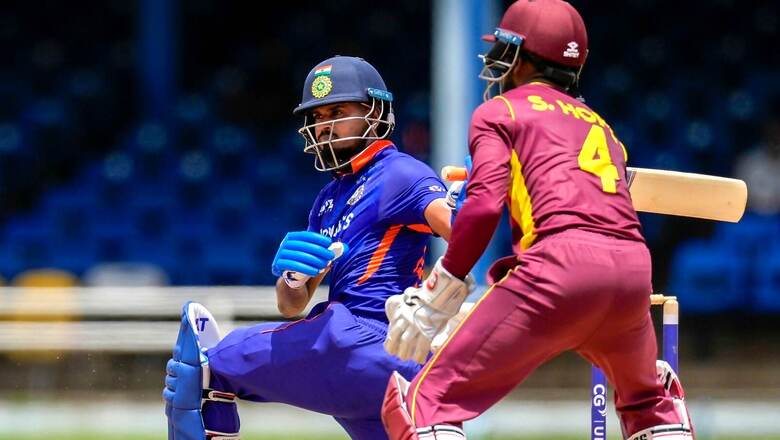
views
Keeping aside the odd timings for the viewers in India, the current bilateral ODI series between the West Indies and India in the Caribbean islands has not drawn as much importance as normally would any series involving India.
Aman Sekhar of Class 12 in Mumbai still finds time amidst his studying schedule to check out the T20 scores the world over but not of 50 overs matches. Senior citizen Sridhar Rangachari from Bengaluru stayed awake for a T20 involving West Indies and Bangladesh recently but not for the current West Indies-India ODI series.
The current superstars of Indian cricket include the all-format captain Rohit Sharma, the struggling but all-time India great Virat Kohli, the sensational Rishabh Pant, ace pacers Jasprit Bumrah and Mohammad Shami have all given the tournament a miss citing rest and workload management.
The absence of these big-time crowd pullers has removed the sheen away from the current ODIs as much as the ODIs per se are gradually losing their relevance. A player as big a name as Englishman Ben Stokes’ recent retirement from the ODIs as he said it was “unsustainable" to play all the three formats has once again raised the topic of the importance of the 50-over white-ball cricket.
Even a country like South Africa, one of the premier limited-overs teams in the world, withdrawing from a three-match bilateral ODI series in Australia early next year as it clashed with their own new franchise T20 league is only a sign of things that are feared to follow, as would players playing all the three formats going the Ben Stokes way.
‘EVERY COUNTRY WANTS INDIA TO VISIT THEM’
It is no secret that T20s are here to stay. Like Prof. Ratnakar Shetty, BCCI’s long-standing administrator until recently and one who has held many prime positions in his long stint in cricket administration at the Board and Mumbai Cricket Association, said to News18 CricketNext, “There was a time when the BCCI used to beg for a home series involving England, Australia or West Indies, and had to pay guarantee money in those days. Now, things have totally changed. Every country wants a visit from the Indian team for a bilateral series, even if it is only for T20Is, only for ODIs, or only for two or three Tests."
“They want a home series involving the Indian team. That is only because their media rights earning is based on those tours. Keep aside the media rights of India, Australia and England, every other country is struggling with the rights. Every country including Australia and England wants India once in a four-year cycle. Things have changed to that extent. In a way, the BCCI is helping them generate revenues and hence accepting and giving dates for a number of bilateral tours," he added.
‘T20 CRICKET IS HERE TO STAY’
Former left-arm spinner and selector Venkatapathi Raju has always maintained that T20 cricket is the way forward and is here to stay. Raju, a former Asian Cricket Council Development Officer, said that the authorities should find a way and manage to have ODIs as well. He felt that Test cricket still has its relevance as the recent Test in England as well as others drew lots of crowds.
The 1992 and 1996 World Cupper said to this website: “T20s are what people watch nowadays. T20s are the most happening ones. Even among women, T20 cricket is in demand. T20 is going to stay wherever you go. Be it the Olympics, the Commonwealth Games (the upcoming Commonwealth Games in Birmingham will see cricket being introduced with India also participating in the T20 format) T20 is a three-hour fixture."
Raju, who recently oversaw the qualifying tournament for the women’s T20 Asia Cup in Malaysia, has always advocated a separate window for the ODIs in a year and get all the teams to play.
He said: “You have separate windows for World Test Championships. Likewise, have one for ODIs and for T20s. If at all they want to have 50 overs, it must be for two months, finish off all the 50 overs, be it in the form of a triangular or quadrangular series. Like you have a two-month window for IPL, have a similar window for ODIs. That way, the relevance of ODIs will still not be lost."
‘A LOT WILL FOLLOW STOKES’
Former India wicket-keeper and chairman of selectors, Kiran More, was of the view that “a lot of people will follow Stokes and take a call on one format of their career". He said that India had a lot of talent and competition for places, unlike England. “England players play a lot of county cricket besides the international matches. Whereas, hardly any Indian international plays in domestic cricket," More said.
Rohit Sharma, during India’s 2-1 ODI series win in England recently, touched upon the triangular and quadrangular tournaments that have lost their way. Something that was an annual feature before the advent of T20s, India were also regularly featuring in tri-series, especially in Australia. He had said, “I do think it is important but it can be managed in a better way, for sure. The scheduling has to be done with some space as well. You have to play bilateral series. When I was growing up, I watched a lot of tri-series or quadrangular series. But, that has completely stopped. I think that can be a way forward so that there is enough time for a team to recover and get back," said Rohit, batting for ODIs.
Shetty and Raju also touched upon the scheduling for the various formats so that each maintained its importance.
Raju said: “The 50-over World Cup is more important. You could have more 50-over matches leading to the 50-over World Cup and in the year of the T20 World Cup, have more T20s."
‘YOU CAN NOT DO AWAY WITH ODIs’
Shetty said: “In the current scenario, with T20 leagues being held in most countries, the bilateral series itself is now becoming a challenge. We have seen the case of Ben Stokes. That is probably the truth for most cricketers that we can see coming because the preference for T20 leagues is definitely more than bilateral tours, at least in some countries.
“The condition that the BCCI put right at the start of the IPL (in 2008) was that those contracted for IPL cannot play in other leagues. That made our players available for bilateral series unless they were physically unfit. The question now is the workload factor that cricketers are talking about. Because their priorities have changed. In that sense, the number of one-day games in a bilateral tour is something that the boards have to sit down and take a call on.
“Before the advent of T20s, we used to have five or seven ODIs in a series. Triangulars were played regularly. Now, ODIs are reduced to three matches in a series. It still has relevance. You cannot do away with ODIs. The number of T20s and ODIS, if restricted to three as is the number of Tests in most cases, is a fairly good balance. And, that should help. The ODI World Cup every four years is still important and makes sense."
With the point system in force for the teams to qualify for the 50-over World Cup, the longer white-ball format still holds its important place in the busy calendar.
Shetty added: “People still play to win the 50-over World Cup. That is the reason the ICC introduced the point system for qualification for the World Cup. That is one of the reasons to keep it relevant. Except for the host country, others have to qualify for the World Cup. Somehow, the boards have to sit with the players and reach a balance, and see how best their players are available for the tours so that the strength of the team is also maintained."
More added: “They need to plan it properly. They can’t have too much either. After all, there is a 50-over World Cup. You play triangular series like we used to play in Australia. That builds up nicely for the World Cup."
However, More asked if new countries have really emerged on the international scene? “We are talking about too much cricket being played these days. But, where have countries developed cricket? Where is the development? Have new countries emerged? We see only a few countries playing a lot of cricket. If they play a tri-series, that will benefit more than playing a bilateral all the time. India have to be involved in all the series. My only issue is that overall you look at it, no new country has come up. In fact, some of the existing countries are going down. Zimbabwe have gone down. Overall, you have to plan properly."
‘ICC HAS TO DECIDE’
Plan properly, that is what 1983 World Cup winning member of the Indian team and swashbuckling batsman of yesteryear, Sandeep Patil, said. “It is for the International Cricket Council to decide. Individuals will keep commenting (on the relevance or irrelevance of ODIs and bilateral series). Ultimately, the ICC has to decide. They are doing a good job overall."
Patil, the former chairman of selectors, said that he still preferred the oldest format of the game, Test cricket. “I would definitely prefer Test cricket No. 1, ODIs No. 2, and T20s No. 3."
It is early to jump the gun and say ODIs are irrelevant. There is still a place for each and every format if, as the experts have said, the proper balance between the three is found and scheduling is done in the right manner. As is often said, an overdose of anything is bad. The same applies to cricket. And in today’s scenario, where time is at a premium, the right mix of every format makes for a perfect dish. The die-hard cricket fans like Aman and Sridhar and everyone else across different age groups are well served.
Get all the latest Cricket News, Schedule and Cricket Live Scores here




















Comments
0 comment